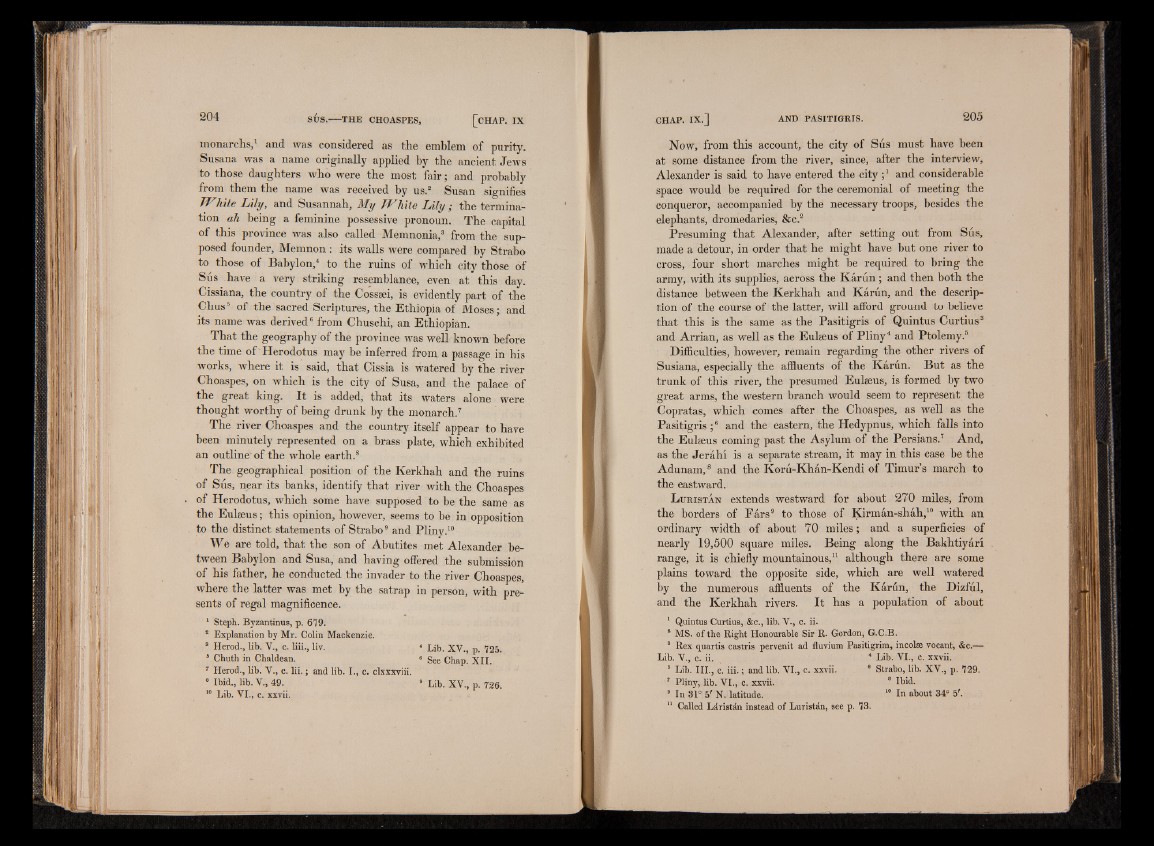
monarchs,1 and was considered as the emblem of purity.
Susana was a name originally applied by the ancient Jews
to those daughters who were the most fair; and probably
from them the name was received by us.2 Susan signifies
Lily , and Susannah, My TVhite L ily ; the termination
ah being a feminine possessive pronoun. The capital
of this province was also called Memnonia,3 from the supposed
founder, Memnon : its walls were compared by Strabo
to those of Babylon,4 to the ruins of which city those of
Sus have a very striking resemblance, even at this day.
Cissiana, the country of the Cosssei, is evidently part of the
Chus5 of the sacred Scriptures, the Ethiopia of Moses; and
its name was derived6 from Chuschi, an Ethiopian.
That the geography of the province was well known before
the time of Herodotus may be inferred from a passage in his
works, where it is said, that Cissia is watered by the river
Choaspes, on which is the city of Susa, and the palace of
the great king. It is added, that its waters alone were
thought worthy of being drunk by the monarch.7
The river Choaspes and the country itself appear to have
been minutely represented on a brass plate, which exhibited
an outline’ of the whole earth.8
The geographical position of the Kerkhah and the ruins
of Sus, near its banks, identify that river with the Choaspes
of Herodotus, which some have supposed to be the same as
the Euleeus; this opinion, however, seems to be in opposition
to the distinct statements of Strabo9 and Pliny.10
We are told, that the son of Abutites met Alexander between
Babylon and Susa, and having offered the submission
of his father, he conducted the invader to the river Choaspes,
where the latter was met by the satrap in person, with presents
of regal magnificence.
1 Steph. Byzantinus, p. 619.
1 Explanation by Mr. Colin Mackenzie.
8 Herod., lib. V., c. liii., liv. 8 Lib. XV., p. 125.
8 Chuth in Chaldean. « See Chap. XII.
7 Herod., lib. V., c. lii.; and lib. I., c. clxxxviii.
8 Ibid., lib. V., 49. 8 Lib. XV., p. 726.
10 Lib. VI., c. xxvii.
Now, from this account, the city of Sus must have been
at some distance from the river, since, after the interview,
Alexander is said to have entered the city ;4 and considerable
space would be required for the ceremonial of meeting the
conqueror, accompanied by the necessary troops, besides the
elephants, dromedaries, &c.2
Presuming that Alexander, after setting out from Sus,
made a detour, in order that he might have but one river to
cross, four short marches might be required to bring the
army, with its supplies, across the Karun; and then both the
distance between the Kerkhah and Karun, and the description
of the course of the latter, will afford ground to believe
that this is the same as the Pasitigris of Quintus Curtius3
and Arrian, as well as the Eulseus of Pliny4 and Ptolemy.6
Difficulties, however, remain regarding the other rivers of
Susiana, especially the affluents of the Karun, But as the
trunk of this river, the presumed Eulseus, is formed by two
great arms, the western branch would seem to represent the
Copratas, which comes after the Choaspes, as well as the
Pasitigris ;6 and the eastern, the Hedypnus, which falls into
the Eulseus coming past the Asylum of the Persians.7 And,
as the Jerahi is a separate stream, it may in this case be the
Adunam,8 and the Koru-Khan-Kendi of Timur’s march to
the eastward.
L u r is t a n extends westward for about 270 miles, from
the borders of Fars9 to those of Kirman-shah,10 with an
ordinary width of about 70 miles; and a superficies of
nearly 19,500 square miles. Being along the Bakhtiyari
range, it is chiefly mountainous,11 although there are some
plains toward the opposite side, which are well watered
by the numerous affluents of the Karun, the Dizful,
and the Kerkhah rivers. It has a population of about
1 Quintus Curtius, &c., lib. V., c. ii.
8 MS. of the Right Honourable Sir R. Gordon, G.C.B.
8 Rex quartis castris pervenit ad fluvium Pasitigrim, incolse vocant, &c.—
Lib. V., c. ii. 4 Lib. VI., c. xxvii.
5 Lib. III., c. i ii.; and lib. VI., c. xxvii. 8 Strabo, lib. XV., p. 729.
7 Pliny, lib. VI., c. xxvii. 8 Ibid.
“ In 31° 5' N. latitude. 10 In about 34° 5'.
" Called Ldristdn instead of Luristdn, see p. 73.